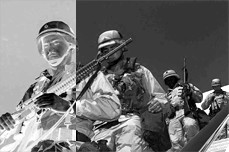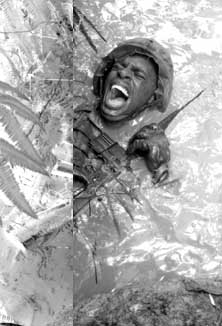|
..:: The Progress of War Senior military officials are said to disagree with Operation Iraqi Freedom, and to be angry "at what they see as the administration's neoconservative ideologues' playing fast and loose with soldiers' lives." Army commanders have complained that the Department of Defense did not deploy enough US troops to the theater in the initial phase of war. One colonel said, "[Rumsfeld] wanted to fight this war on the cheap. He got what he wanted." US troops asked by Iraqis to maintain order in Baghdad have said they do not have enough men to keep order. ..:: Inadequate Safety Preparations Veterans, lawmakers from both parties and the General Accounting Office have said that the military is not equipped at present to give servicepeople adequate protection against biological and chemical warfare. The General Accounting Office reported "continuing concerns" about equipment, training and research. A new handbook from the US Army Combined Arms Center warns that the chem-bio masks and overgarments issued to line troops are insufficient to protect against the kind of concentrated contaminants that could be encountered in a chemical or biological weapons facility. There are severe problems with the military's stock of protective suits — far too many older, decaying suits; too few of the new, highly protective suits; 250,000 defective suits unaccounted for — as well as problems with gas masks which have the wrong gaskets. The water supply for military troops has not been safeguarded against chemical and biological weapons. Even where masks and garments are adequate protection, troops could still end up consuming contaminated water. Field training for nuclear, biological and chemical weapons (NBC) weapons is not robust: the training is only 2 to 4 hours a year, does not involve simulation of worst-case scenarios, and is sometimes optional. The GAO told Congress that despite a recent push to prioritize NBC training, the training is still inadequate. Veterans of the first Gulf War also say that the military has not adapted its protective equipment to safeguard against the chemical and biological weapons encountered in the first Gulf War, and has not trained servicepeople for prolonged ground conflict. The Department of Defense admits that during the Gulf War, 436,000 troops entered into or lived for months within areas contaminated by more than 315 tons of depleted uranium radioactive toxic waste, almost all without any awareness, training, protective equipment, or medical evaluations. Hundreds of thousands lived outdoors for months near more than 700 burning oil well fires belching fumes and particulate matter without any protective equipment. Even the best equipment and training will leave US soldiers unprotected against some biological and nerve agents. If the Bush administration wants to enforce regime change because Saddam has biological and chemical weapons, why would it send soldiers into war without protecting them as much as possible against these threats? ..:: War-time Casualties War always means casualties. There have been over a hundred confirmed Coalition deaths in the war so far. In the Gulf War, 148 US soldiers died in combat, another 145 Americans died in non-combat circumstances, and 467 US were wounded. However, there were only 100 hours of ground warfare during the Gulf War, which had the limited aim of making the Iraqis retreat from Kuwait. This war aims to secure Iraq, with an envision an occupation force staying in Iraq for years. This will increase the number of US dead and disabled. ..:: Post-War Casualties Casualties are not limited to those who are killed or wounded during the war. Debilitating illness will continue to manifest after the war is over. Tremendous numbers of Gulf War veterans have become sick. The Department of Veterans Affairs classifies nearly 30% of Gulf War vets as disabled. More than ten thousand Gulf War veterans have died in the decade after the war. More than 159,000 Gulf War veterans are receiving disability payments. Thousands suffer from memory loss, dizziness, blurred vision, speech difficulties, nerve disorders and muscle weakness. They have reported higher incidences of cancers in themselves and birth defects in their children. Exposure to Iraqi chemical weapons, radiation from US use of depleted uranium ammunition, and experimental vaccines have been identified as possible causes for Gulf War Syndrome. Depleted uranium was used in Afghanistan and is being used in Iraq. For all that veterans have suffered, the Department of Defense and the Department of Veterans Affairs have been shamefully inadequate about providing support and compensation to veterans. The government has tried to dismiss Gulf War vets' claims, rather than honoring them. ..:: Other Risks to US Soldiers During the Gulf War, servicepeople were ordered to take experimental anthrax vaccines, which were later linked to Gulf War Syndrome. Captain Yolanda Huet-Vaughn, a physician, based her case as a Conscientious Objector on the Nuremburg Code, which forbids experimentation on people without their consent. In December, 1994, the Senate Veterans Affairs Committee stated that "the efficacy of the vaccine against biological warfare is unknown." In February, 2000, the House Government Reform national security subcommittee produced a report, written by its Republican majority, recommending that the anthrax vaccination program be halted, and that the vaccine be considered experimental because its effectiveness was unclear. A November 2002 General Accounting Office survey found that the vaccine caused adverse reactions in 85% of vaccinated servicepeople. Despite these findings, GIs fighting in Iraq will be again ordered to take the anthrax vaccine. Servicepeople will also be ordered to take the smallpox vaccine, which is not experimental, but which does have some risk of life-threatening complications. Air Force combat pilots were given amphetamines ("speed") during the Gulf War, but the practice was halted when pilots started to become addicted to the drug. But in Afghanistan, amphetamines again became standard issue, and the Air Force told combat pilots that they could be considered unfit to fly certain missions if they didn't take the amphetamines. Amphetamines have been implicated in the friendly fire killings of Canadian soldiers by US pilots. ..:: From the Poverty Line to the Front Line US soldiers, and frontline troops in specific, are disproportionately from the poorest communities in the United States, poor rural whites and poor African-Americans and Latinos. Rep. Charles Rangel said on NPR, "When I talk with people who support the war, I ask, 'Do you have any idea, do you know anybody who has anybody in the military that would be exposed to this pain and this sacrifice?' And they don't, because these people are not able to negotiate for themselves. And others have treated this as though it was the French Foreign Legion. After all, they volunteered. They're being paid to fight. And a lot of those kids and their families have been on food stamps." The burden of war will be borne by the weakest sections of US society. And the Bush administration has not supported the troops. Department of Defense Undersecretary David Chu maligned disabled military retirees as "greedy". The Bush administration's budget proposal cut funding for Impact Aid, a program for school districts with a large number of millitary families. The first House budget included $25 billion in cuts to veterans-related programs. Last minute changes in Congress restored most of this funding but Congress is still considering $14.6 billion in cuts to veterans benefits over the next 10 years, including $449 million of vets medical benefits from next year's budget. The money will come from funding for treatment of service-connected injuries and pensions for low income vets. |
LIES | THRIVES | ACT | CONTACT
The Progress of War : Pentagon Contradicts General on Iraq Occupation Force's Size, NYT : US Said Prepared to Pay 'High Price' to Oust Saddam, Reuters : Marines Discard Chemical Suits, Reuters : Gulf War Syndrome II, Alternet : US Troops' Anguish: Killing Outmatched Foes, CSM Military Opposition to the Rush to War : Veteran Intelligence Professionals for Sanity : Retired Marine Gen. Anthony Zinni : Retired Marine Gen. John J. Sheehan : Retired Gen. Norman Schwarzkopf : Commander Maj. Gen. Patrick Cordingley : Ten Reasons Why Many Gulf War Veterans Oppose Re-Invading Iraq, Alternet : Military Voices of Dissent, BBC : Members of the US Army Reserve Speak Out : Senior Military Officers Disagree with Operation Iraqi Freedom, Toronto Star : Sp/4 Ghanim Khalil, Conscientious Objector : Pvt Wilfredo Torres, Conscientious Objector : Conscientious Objectors Growing, NYT : Lance Cpl. Funk, Conscientious Objector Related Organizations : Veterans Against The Iraq War : Call to Conscience: by US vets : Committee for Conscientious Objectors
Related Articles : DoD Persian Gulf War Statistics : A Duty to Disobey All Unlawful Orders, CP : Those Who Know War Protest for Peace, Newsday : Gulf War Vet's Father Speaks Out, RMN : Sending the Poor to Fight, Voice : Bush, GOP Take Aim at Vets, Boston Herald Testimony Fred Jensen is the father of a Gulf War vet who is nearly blind from exposure to nerve gas. Jeff Jensen's retinas were peeled off his eyes, he doesn't even have enough nerve endings for them to be welded back on. Nine years after the war, the Dept. of Defense sent him a letter saying that since he was exposed to nerve gas for less than 72 hours, he was OK. Fred Jensen says that his son's treatment is reason enough to oppose a new war, which would expose a new generation of soldiers. Fred Jensen said, "I'd hate to see anyone else's family go through this. These people haven't been truthful to us, and they won't be truthful with the next group."
Dulce Et Decorum Est If in some smothering dreams, you too could pace |





